Why is a NASA spacecraft crashing into an asteroid?
Thursday, 22 September 2022 16:13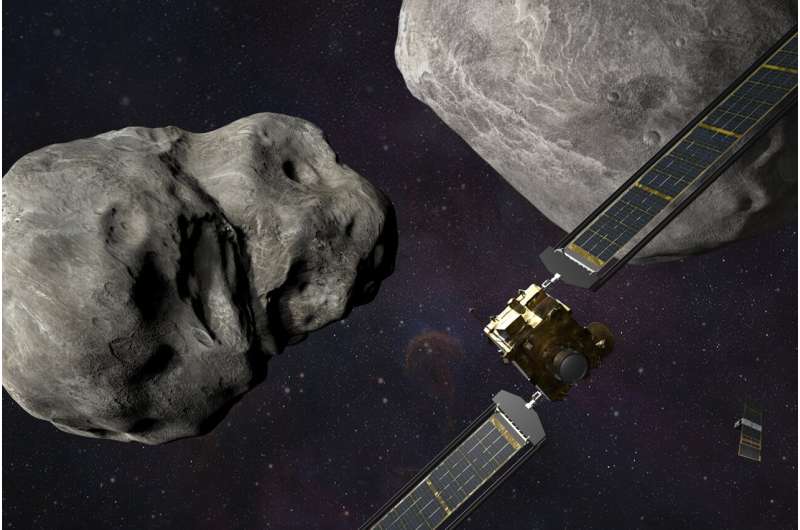
Marlink to offer Starlink to maritime and enterprise customers
Thursday, 22 September 2022 15:25
Maritime connectivity specialist Marlink will offer Starlink to its customers as SpaceX’s broadband service turns to partners to expand beyond the consumer market.
The post Marlink to offer Starlink to maritime and enterprise customers appeared first on SpaceNews.
ESA selects Harmony as tenth Earth Explorer mission
Thursday, 22 September 2022 13:20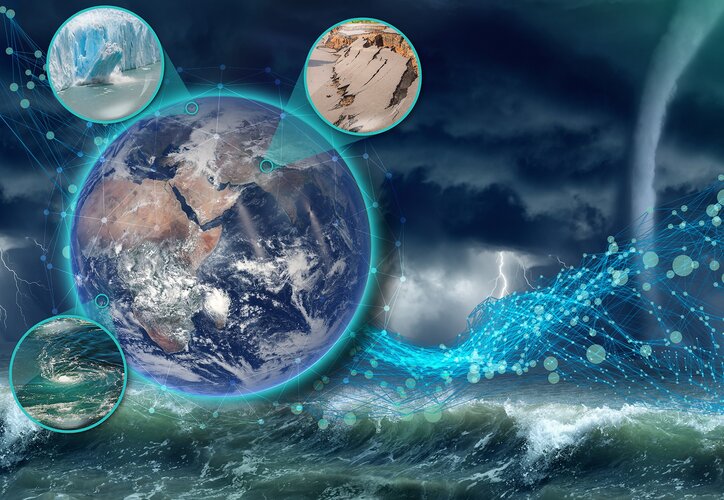
Following preparatory activities and a stringent process ESA Member States today formally selected Harmony for implementation as the tenth Earth Explorer mission within the FutureEO programme. This unique satellite mission concept is, therefore, now set to become a reality to provide a wealth of new information about our oceans, ice, earthquakes and volcanoes – which will make significant contributions to climate research and risk monitoring.
JPSS-2 begins launch processing
Thursday, 22 September 2022 13:02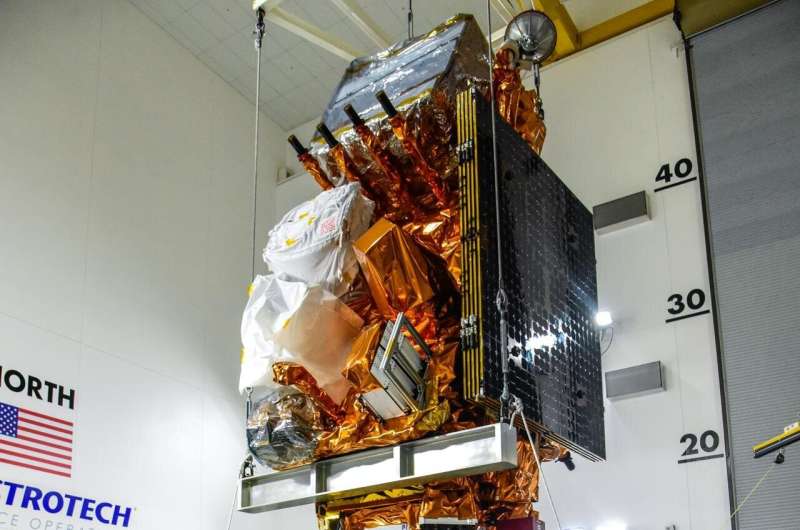
Preparations are looking up for the launch of the National Oceanic and Atmospheric Administration's (NOAA) Joint Polar Satellite System-2 (JPSS-2) satellite. On behalf of NOAA, NASA develops and builds the instruments, spacecraft, and ground system, and launches the satellites, which NOAA operates. Technicians recently lifted the satellite to a stand inside the Astrotech Space Operations facility at Vandenberg Space Force Base in California. On board are four advanced instruments that will measure weather and climate conditions on Earth. Launch is targeted for Nov. 1 atop a United Launch Alliance (ULA) Atlas V 401 rocket from Space Launch Complex-3.
Launching with JPSS-2 is a secondary payload, known as Low-Earth Orbit Flight Test of an Inflatable Decelerator, or LOFTID. LOFTID will demonstrate inflatable heat shield technology for atmospheric entry and re-entry. This technology could enable a variety of proposed NASA missions to destinations such as Mars, Venus, and Titan, as well as returning heavier payloads from low-Earth orbit.
Before launch, technicians will stack the JPSS-2 satellite onto a payload adapter canister containing the LOFTID reentry vehicle.
Saudi Arabia plans to send female astronaut to space in 2023
Thursday, 22 September 2022 12:11
Pillar of light
Thursday, 22 September 2022 11:22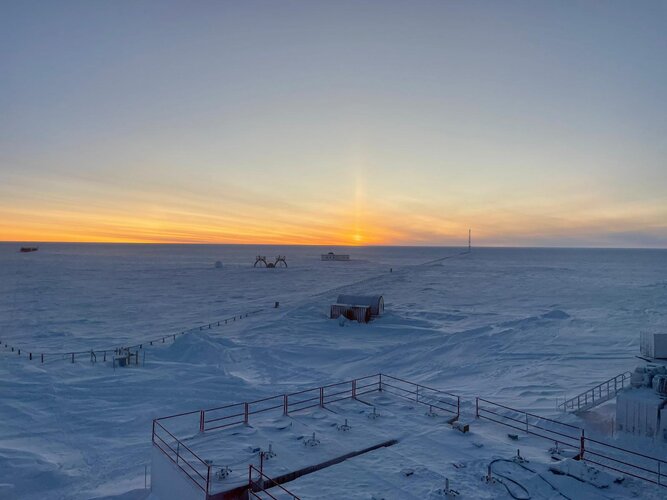 Image:
Image:
A vertical beam of sunlight appears to shoot up into the sky outside Concordia research station in Antarctica in this image taken by ESA-sponsored medical doctor Hannes Hagson.
Known as a sun pillar, this optical phenomenon occurs when sunlight is reflected from tiny ice crystals suspended in the atmosphere. Though it appears to reach from the sun itself, the pillar is not physically located above or below the sun. But it’s not just the sun that creates this optical illusion. Moonlight, and even streetlights, can create the same effect in icy conditions, in which case it is known more
The incredible adventures of the Hera mission – Creating a crater
Thursday, 22 September 2022 11:00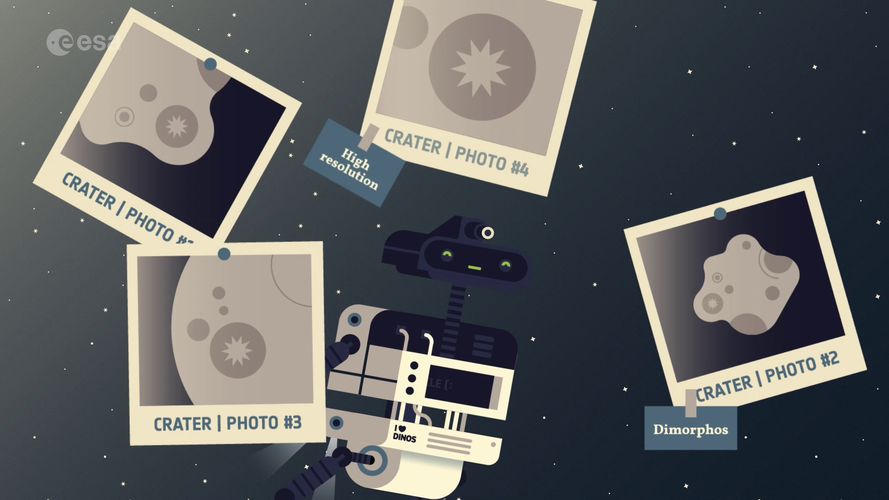 Video:
00:02:36
Video:
00:02:36
Meet Hera, our very own asteroid detective. Together with two small CubeSats – Milani the rock decoder and Juventas the radar visionary – Hera is off on an adventure to explore Didymos, a double asteroid system that is typical of the thousands that pose an impact risk to planet Earth.
Suitable for space enthusiasts young and old, this episode of ‘The incredible adventures of the Hera mission’ is all about craters. What are they? Why are they important? Why is NASA’s DART spacecraft about to collide with an asteroid to create the Solar System’s newest – and perhaps
Maritime Launch and Skyrora partner to launch Skyrora XL from Spaceport Nova Scotia
Thursday, 22 September 2022 10:33 Maritime Launch Services Inc. (Maritime Launch) (NEO: MAXQ, OTCQB: MAXQF) and Skyrora are pleased to announce that they have signed a Letter of Intent to launch Skyrora XL from Spaceport Nova Scotia. Maritime Launch is developing and operating Spaceport Nova Scotia, Canada's first orbital launch complex and the first commercial spaceport in North America. Headquartered in Edinburgh with faciliti
Maritime Launch Services Inc. (Maritime Launch) (NEO: MAXQ, OTCQB: MAXQF) and Skyrora are pleased to announce that they have signed a Letter of Intent to launch Skyrora XL from Spaceport Nova Scotia. Maritime Launch is developing and operating Spaceport Nova Scotia, Canada's first orbital launch complex and the first commercial spaceport in North America. Headquartered in Edinburgh with faciliti Kayhan Space and Precious Payload team to boost access to space traffic management
Thursday, 22 September 2022 10:33 With satellite and mission operators grappling with unprecedented congestion in space, Kayhan Space and Precious Payload has announced a strategic partnership to provide more access to breakthrough spaceflight safety solutions.
As part of the collaborative agreement, Precious Payload will offer Pathfinder - Kayhan's collision avoidance and conjunction assessment software - to satellite ope
With satellite and mission operators grappling with unprecedented congestion in space, Kayhan Space and Precious Payload has announced a strategic partnership to provide more access to breakthrough spaceflight safety solutions.
As part of the collaborative agreement, Precious Payload will offer Pathfinder - Kayhan's collision avoidance and conjunction assessment software - to satellite ope Iridium announces Operation Pacific Waves
Thursday, 22 September 2022 10:33 Iridium Communications Inc. ( Nasdaq: IRDM) has announced Operation Pacific Waves (OPW), a series of partnership-driven field exercises involving more than 20 organizations. Focused on the Indo-Pacific region, OPW will deploy Iridium and Iridium Connected equipment in live scenarios highlighting the Iridium network's resilient, real-time and truly global capabilities.
A variety of Iridium
Iridium Communications Inc. ( Nasdaq: IRDM) has announced Operation Pacific Waves (OPW), a series of partnership-driven field exercises involving more than 20 organizations. Focused on the Indo-Pacific region, OPW will deploy Iridium and Iridium Connected equipment in live scenarios highlighting the Iridium network's resilient, real-time and truly global capabilities.
A variety of Iridium Rocket Lab selects NASA Stennis Space Center for Neutron Engine Test Facility
Thursday, 22 September 2022 10:33 Rocket Lab USA, Inc (Nasdaq: RKLB) has selected NASA's historic Stennis Space Center in Mississippi as the location of its engine test facility for its reusable rocket, Neutron.
The Archimedes Test Complex will be located within the larger A Test Complex at Stennis Space Center across a 1 million square foot area for 10 years, with an option to extend the lease for an additional 10 years.
Rocket Lab USA, Inc (Nasdaq: RKLB) has selected NASA's historic Stennis Space Center in Mississippi as the location of its engine test facility for its reusable rocket, Neutron.
The Archimedes Test Complex will be located within the larger A Test Complex at Stennis Space Center across a 1 million square foot area for 10 years, with an option to extend the lease for an additional 10 years. Starburst Ventures launches new Pre-Seed and Seed Fund for Aerospace and Defense
Thursday, 22 September 2022 10:33 Starburst Ventures, the first venture capital fund dedicated to investing across aviation, space, and defense, has announced the launch of its new early-stage fund. Focusing on aerospace, defense, security, as well as enabling sciences and technologies, Starburst Ventures is investing in the next generation of industrial, software and hardware companies.
The fund's team will be led by Star
Starburst Ventures, the first venture capital fund dedicated to investing across aviation, space, and defense, has announced the launch of its new early-stage fund. Focusing on aerospace, defense, security, as well as enabling sciences and technologies, Starburst Ventures is investing in the next generation of industrial, software and hardware companies.
The fund's team will be led by Star Rocket Lab hosts Investor Day in New York
Thursday, 22 September 2022 10:33 Rocket Lab USA, Inc. (Nasdaq: RKLB), a leading launch and space systems company, has hosted an Investor Day and Neutron Development Update at the Intrepid Air, Sea and Space Museum in New York City and streamed the event live on YouTube.
Rocket Lab Founder and Chief Executive Officer Peter Beck, joined by members of the Company's executive leadership team, provided a series of presentation
Rocket Lab USA, Inc. (Nasdaq: RKLB), a leading launch and space systems company, has hosted an Investor Day and Neutron Development Update at the Intrepid Air, Sea and Space Museum in New York City and streamed the event live on YouTube.
Rocket Lab Founder and Chief Executive Officer Peter Beck, joined by members of the Company's executive leadership team, provided a series of presentation NASA says delayed Moon rocket passed fueling test
Thursday, 22 September 2022 10:33 NASA said Wednesday it had successfully trialed the fueling process for its new rocket, after technical issues a few weeks ago halted two attempts to get the behemoth off the ground and headed towards the Moon.
"All of the objectives that we set out to do we were able to accomplish today," said Charlie Blackwell-Thompson, launch director of the program called Artemis 1.
The unmanned miss
NASA said Wednesday it had successfully trialed the fueling process for its new rocket, after technical issues a few weeks ago halted two attempts to get the behemoth off the ground and headed towards the Moon.
"All of the objectives that we set out to do we were able to accomplish today," said Charlie Blackwell-Thompson, launch director of the program called Artemis 1.
The unmanned miss Artemis Cryogenic Demonstration test concludes, all objectives met
Thursday, 22 September 2022 10:33 The launch director has confirmed all objectives have been met for the cryogenic demonstration test, and teams are now proceeding with critical safing activities and preparations for draining the rocket's tanks. After encountering a hydrogen leak early in the loading process, engineers were able to troubleshoot the issue and proceed with the planned activities.
The four main objectives for
The launch director has confirmed all objectives have been met for the cryogenic demonstration test, and teams are now proceeding with critical safing activities and preparations for draining the rocket's tanks. After encountering a hydrogen leak early in the loading process, engineers were able to troubleshoot the issue and proceed with the planned activities.
The four main objectives for 
